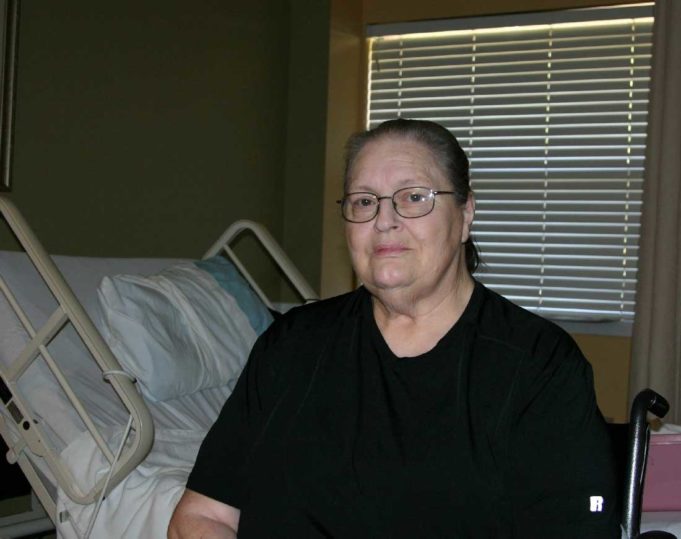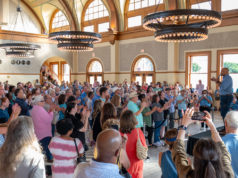When Sandra Wood saw Billy Mittell earlier this month, the mute man with Down syndrome was making a sign created by putting his fingers together to fashion what looks like a roof. It’s the sign for “home.” Mittell was telling Wood he wanted her to take him back to where they lived for 30 years. It’s the same sign he was making the last time they saw each other back in January.
Mittell wasn’t born to Sandra Wood, but he latched onto her strongly once she became his legal guardian in 1986. Mittell, who spent his early years living in group homes with other mentally challenged patients, was thrilled to be taken in by Wood and given his own room in a real house. The woman he called “mother” loved him as if he were her flesh and blood.
But plenty has been broken in Wood’s life recently, most notably her heart. More literally, you can include two legs, an arm, and several teeth. It’s been a rough summer following a horrible winter.
The Fort Worth Weekly introduced Wood to readers in a 2016 cover story that described how a probate court judge removed her as Mittell’s primary caretaker (“Torn Apart,” March 16).
The 71-year-old Fort Worth resident was distraught after Adult Protect Services workers took Mittel in January, put him in a group home, and prevented Wood from seeing him. Mittell has no known relatives and had long relied on Wood for his basic needs and protection. They became a tight-knit duo that spent most days venturing out to eat lunch, playing bingo, visiting friends, feeding ducks at parks, and doing most anything else that was fun. Wood had carted Mittell to the same barber twice a month since the 1980s, and she even paid for regular manicures and pedicures for Mittell because he enjoyed them so much.
At a bingo hall on January 3, Mittel stumbled and fell in a parking lot. Wood took him to a hospital. Mittel’s injuries were not serious. And he had gone years without any health problems under Wood’s care. But a hospital nurse questioned Wood’s ability to care for Mittel. A swarm of social workers, medical professionals, and probate court representatives descended on Wood in the following days and quickly removed Wood’s guardian status. Mittel was gone.
Court officials will not discuss ongoing cases, but Aaron Shutt spoke to me about Wood and Mittell. Shutt is a board member of Guardianship Services Inc., the agency composed of case managers assigned by probate court judges to make decisions regarding a client’s housing, medical treatment, and money management.
“I understand that this is her son by all practical purposes,” Shutt said. “It is not our business to keep families apart. But our duty is to do what is best for the ward, and that is a delicate balance sometimes.”
In 2015, the Texas Legislature established the “least restrictive services” law, an act that more stridently requires guardianship to be considered as a last resort. Still, probate judges have shown in the past that they can interpret laws and dole out justice in most any manner they choose, including making decisions in closed hearings without family members being present and stripping defendants of their right to hire their own attorneys.
Wood began an immediate campaign to re-establish herself as guardian and get Mittel back home. She discovered what many people in Tarrant County have learned in the past 25 years –– local probate courts have established a network of medical care providers, attorneys, bankers, investigators, and professional guardians to take control of family situations gone awry. Many of those families say that the probate judges, however, are most interested in removing people from their families. Often times, group homes and other care facilities receive funding based on how many patients they serve. Banks are paid to watch the money. Attorneys and investigators are paid for their appointments. Many of those same people support the judges financially during elections.
Wood discovered that none of the social workers wanted to talk to her, much less tell her where Mittel had been taken. Court officials told her to lawyer up. Wood has little money to pay for a long court battle against a powerful probate judge and a well-oiled guardianship system.
Wood, overweight and diabetic, became distraught. Her appetite waned. She lost 50 pounds in three months. Her blood sugar levels fluctuated, and she became dizzy at times.
Wood called me on May 11 and said she had reached a caseworker by telephone and been given an opportunity to visit with Mittel in person at his group home later that week. Wood wanted me to go with her. I agreed but didn’t hear back from her. My phone calls to her went unanswered.
Three months passed. On August 24, I was sitting at my desk, thought of Wood, and called her cellphone number. She answered from a hospital bed, where she had been lying since the day after we had last spoken. Back in May, she had awakened, climbed out of bed, and headed toward the kitchen.
“I was walking down the hall thinking, ‘Should I make scrambled eggs or hard-boiled eggs?,’ and two days later I woke up, and I was lying on the floor,” she said.
A married couple and their two young children who live next door to her South Fort Worth home had come over to check on Wood. They found her lying unconscious.
“When I opened my eyes, all of them were standing over me,” Wood recalled. “I was bleeding from the mouth because I had knocked out a bunch of teeth. I woke up spitting teeth. The little boy picked one up and said, ‘Do you have to take this to the doctor?’ I said, ‘No, just put it in the trash.’ ”
The neighbors called an ambulance, and an EMT discovered Wood’s blood sugar was dangerously low. Doctors at Texas Health Harris Methodist Hospital treated her fractures, but Wood hasn’t been able to visit a dentist and still has half-broken teeth in her mouth.
Wood said her collapse is a direct result of having Mittel stripped away from her.
“I had been crying all the time and was upset all the time,” she said. “That kind of stress kills you. I miss [Mittel] so much.”
Once Wood began recovering, she resumed her calls to the probate court and its guardianship workers, trying to arrange a visit with Mittel. But her messages went unanswered, she said.
Probate court investigator Jeffery Arnier had sent a letter to Wood in May saying that “there is nothing preventing you from visiting [Mittel] and being a part of his life.” Arnier closed the letter by writing, “To my understanding, Guardianship Services, Inc. has not restricted you from access to [Mittel] and continuing to be a part of his life.”
Wood, however, couldn’t get anyone at Guardianship Services to talk to her, other than when she was told to get a lawyer.
I visited Wood at her hospital room on August 26 and found her in good spirits despite being confined to a wheelchair. She had lost another 50 pounds on top of the previous 50 pounds and looked like a different person than she was nine months ago when Mittel was removed from her home.
“Wow, you’ve lost weight,” I said.
“Well, that’s one way to lose it,” she said.
A court representative had told Wood that someone with the group home would be bringing Mittel for a visit on September 2 at Renaissance Park Multi-Care Center, where Wood was recuperating in west Fort Worth. Wood, however, was not given a specific time when Mittel would arrive. I wanted to document the reunion with pictures and a story and asked Wood to call me as soon as Mittel arrived. I could drive to Renaissance within about 20 minutes.
Wood called that afternoon to say Mittel had just arrived and for me to come quickly. I jumped in my truck and drove straight there. But by the time I arrived, the group home leader had already taken Mittel away. The visit had been a short one.
“They came in and weren’t here 20 minutes,” she said.
Scott Gordon, a patient at Renaissance, was sitting in the lobby and described seeing the reunion between Mittel and Wood. Many of the Renaissance residents came out of their rooms to see the reunion, he said, because everyone had heard Wood talking about the reunion for days.
“He went right up to her and hugged her,” Gordon said. “He was excited to see her. You can see the connection. You can’t doubt it. It is very evident that he loves Sandy.”
Mittel was unhappy when the reunion was cut short.
“He didn’t want to leave,” Gordon said.
Wood hated to see him go. But she was thrilled at the same time. She had finally been able to hug, squeeze, and talk to Mittel for the first time since January.
Wood is recuperating at home now and requesting another visit from Mittell.
Shutt, the guardianship board member, doesn’t think that will be a problem.
“It is my understanding that they were setting up a schedule whereby there could be regular visits between” Wood and Mittell, he said.
“The intent of Guardianship Services is to allow access and visitation.”
Wood, though, wants more than visitation. She is trying to raise money to hire an attorney to become re-established as Mittel’s guardian. She wants Mittel to move back into his room, which is still furnished and decorated like it was on the day that social workers took him away.
“He wants to be with me,” Wood said.
He wants to be “home.”













Mittel and Wood shared a positive history and relationship. And now, thanks to the interference of the hospital nurse and the resultant guardianship, two lives have been turned upside down and harmed.
Why wasn’t Mittel’s wish to go home respected? If the nurse was “concerned” that Wood needed help, then why weren’t services offered? Why remove him from his home and the comfort of the woman he considered his Mother.
This case appears is a poster case of what’s wrong with guardianship as practiced today.
Join the national movement for reform of unlawful and abusive guardianships and conservatorships. Join NASGA: http://www.StopGuardianAbuse.org
Follow the money.